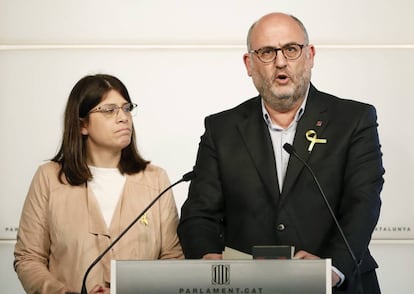Separatists rally behind Puigdemont’s bid to become Catalan premier on Tuesday
But Constitutional Court sets tough conditions for legal appointment, and voices of dissent are heard

Carles Puigdemont could become the new Catalan premier on Tuesday after Spain’s Constitutional Court opened the door this weekend to such a move, if certain conditions are met. The central government in Madrid has conveyed that letting Puigdemont return to the helm of the Catalan government would create a very serious situation for the Spanish state.
Meanwhile, Catalan separatists are presenting a united front in public, but in private several leaders have expressed misgivings about Puigdemont’s insistence on being reinstated despite all the legal problems this creates.
Victory will never depend on a single man, but on a collective strategy
Francesc Iglesias, ERC
The ousted premier will follow the guidelines set by the Constitutional Court on Saturday, and file a petition with the Supreme Court requesting permission to personally attend the investiture debate on Tuesday. This would enable him to be legally voted in by the separatist majority in the Catalan chamber. Two deputies for his Junts per Catalunya political platform, Josep Rull and Gemma Geis, have confirmed that this is the plan for now.
However, Puigdemont needs to file this request personally, not in writing. Gemma Geis said that Puigdemont’s lawyer is working on a way to secure this authorization from Judge Pablo Llarena. Llarena is in charge of an investigation into sedition, rebellion and misuse of public funds by Catalan leaders last year, including Puigdemont himself, who faces arrest if he returns to Spain after failing to show up for his hearing last year.
Unlike other separatist leaders who showed up at their own hearings and were remanded in custody, Puigdemont fled the country and took refuge in Brussels, where he has been campaigning for his return.

Meanwhile, three Catalan deputies who fled to Belgium with him – Lluís Puig, Clara Ponsatí and Meritxell Serret – are giving up their seats to other party members to ensure that separatists in the Catalan parliament retain the required 68 votes (as long as the far-left CUP party agrees to support Puigdemont’s nomination.) The Constitutional Court had warned on Saturday that voting by proxy will not be allowed.
ERC position
The Catalan Republican Left (ERC), whose leader Oriol Junqueras has been in pre-trial detention since November in connection with the Supreme Court probe into the illegal independence push, is officially supporting Puigdemont’s nomination. But in private, the position is less clear.
Party spokesman Sergi Sabrià declared that “now that the stakes are higher than even, it is even clearer that Puigdemont must be our candidate, the candidate of all those who feel like democrats.”
But Joan Tardá, an ERC deputy who sits in the Spanish Congress, said: “It is indispensable to have a government; if Puigdemont needs to be sacrificed, then we’ll have to sacrifice him. Or have there not been patriots throughout history who have had to make sacrifices in order to move forward?”
Reasons of state were invoked
Government source
“Tardà is giving us a lesson that we should have learned long ago: victory will never depend on a single man, but on a collective strategy,” tweeted Francesc Iglesias, the strategy secretary for ERC.
“We at ERC all know that Puigdemont cannot be president, and a lot of people at PDeCAT [the main party in Junts per Catalunya] know it as well, but it won’t be us who are going to come out and say it in public, they’ll have to see it for themselves,” said a high-ranking ERC official.
Dilemma
Puigdemont’s party, Junts per Catalunya, is keeping up the pressure to make sure that no cracks show up in the separatist camp. On Sunday, party spokesman Eduard Pujol took aim at the new house speaker, Roger Torrent, who is a member of ERC.
“We are certain that Torrent will act with the legitimacy invested upon him by his position, by the weight of history and the dignity of the country, and that he will do everything it takes to protect the deputies’ rights.”
Torrent is facing a dilemma. He needs to decide whether to obey the Constitutional Court and prohibit a remote appointment, or to go down the road of disobedience that caused so much trouble to his own predecessor, Carme Forcadell (who was also targeted in the rebellion probe, arrested, and released on bail after asserting that the independence declaration of October was merely symbolic).
He could also put the session on hold, giving separatists time to pursue other options. But this move would violate Catalan rules stipulating that the first investiture debate must take place no more than 10 days after the new parliament has convened for the first time after an election. And that deadline ends on Wednesday.
Panic mode
Emotions were running high in Madrid on Saturday, a day after the State Council, the government's highest advisory body, rejected the national government's decision to challenge Carles Puigdemont's nomination before the Constitutional Court.
Saturday began with deep divisions among the 11 members of the court (a twelfth was on sick leave), who could not agree whether to accept the central government’s appeal.
In the end, this decision was placed on hold. But in the meantime, the court said that Puigdemont may only be legally sworn in as the new Catalan premier if he comes personally to Spain and secures authorization from Supreme Court Judge Pablo Llarena to attend the debate.
The court also warned that any member of the Catalan parliament’s governing body who helps Puigdemont get sworn in without meeting these conditions will face criminal charges.
Government sources admitted that the Spanish executive went into panic mode following the State Council’s adverse decision. Prime Minister Mariano Rajoy went ahead and filed the appeal anyway, and he and several ministers relayed to Constitutional Court members the message that the Spanish state would be placed in a very serious situation if the ousted premier returned to the helm of the Catalan government.
“There was no pressure because no member of the Constitutional Court would allow that, but it was conveyed that democratic institutions would be left in a dramatic situation if Puigdemont were sworn in and they had to act after that,” said sources familiar with the situation. “Reasons of state were invoked.”
“The government does not want anyone else to go to prison, but rather to see a candidate be proposed who is neither a fugitive from justice or a prisoner,” said government sources.
English version by Susana Urra.
Tu suscripción se está usando en otro dispositivo
¿Quieres añadir otro usuario a tu suscripción?
Si continúas leyendo en este dispositivo, no se podrá leer en el otro.
FlechaTu suscripción se está usando en otro dispositivo y solo puedes acceder a EL PAÍS desde un dispositivo a la vez.
Si quieres compartir tu cuenta, cambia tu suscripción a la modalidad Premium, así podrás añadir otro usuario. Cada uno accederá con su propia cuenta de email, lo que os permitirá personalizar vuestra experiencia en EL PAÍS.
En el caso de no saber quién está usando tu cuenta, te recomendamos cambiar tu contraseña aquí.
Si decides continuar compartiendo tu cuenta, este mensaje se mostrará en tu dispositivo y en el de la otra persona que está usando tu cuenta de forma indefinida, afectando a tu experiencia de lectura. Puedes consultar aquí los términos y condiciones de la suscripción digital.










































